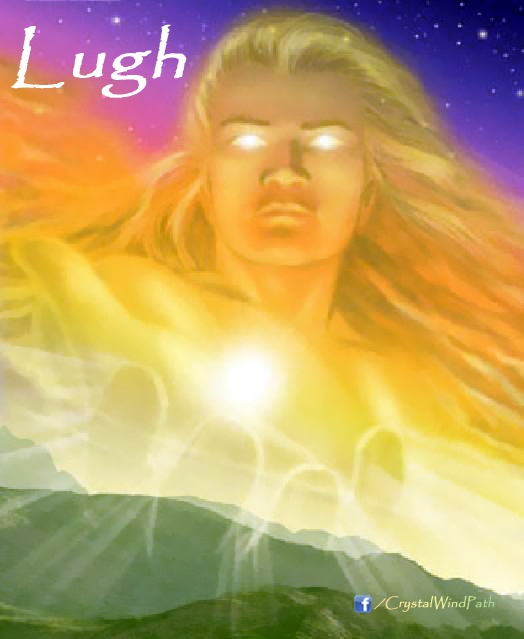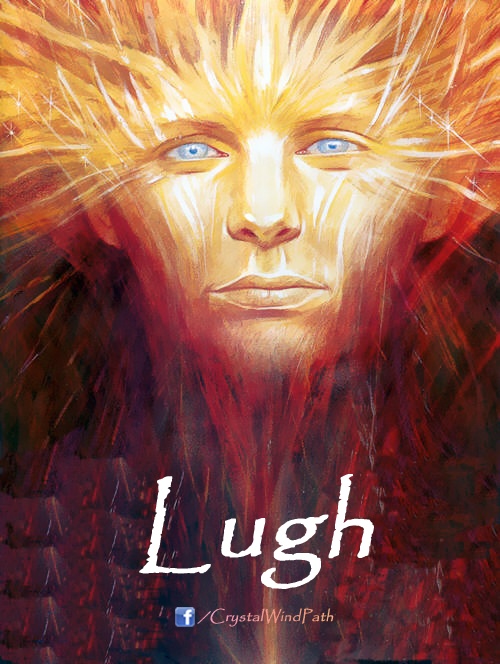This article was posted by CrystalWind.ca.
Lugh - Celtic God Of The Sun
- Details
- Views: 46378

The god Lugh was worshiped in Ireland as a deity of the sun. This connection with the sun may explain his name (it means “shining one”), and it also may account for the attributes that he displayed: he was handsome, perpetually youthful, and had a tremendous energy and vitality. This energy manifests itself especially in the number of skills he had, according to legend, mastered. In fact, there was a tale that related Lugh’s myriad abilities at arts and crafts.
According to Celtic mythology, Lugh was the son of Cian and Ethlinn. After the god Nuadawas killed in the Second Battle of Magh Tuiredh, Lugh became the leader of the Tuatha De Danaan (the term for the gods and goddesses who descended from the goddess Danu).
For the Celts, who lived in central Europe, Lugh was a Sun god. The underworld god Balor was his grandfather. Balor was the leader of the Fomorii. The Fomorii were evil people that lived in the underworld.
According to a prophecy, Balor was to be killed by a grandson. To prevent the happening of the prophecy, Balor tried to kill his grandson, but Lugh miraculously survived. Lugh was secretly raised by the god of the sea ,Manannan, and became an expert warrior.
When he reached manhood, he joined the peoples of the goddess Dana, named the Tuatha de’ Dannan, to help them in their struggle against the Fomorii and Balor. Balor had an evil eye capable of killing whomever looked at it. Lugh threw a magic stone ball into Balor's eye, and killed Balor.

Lugh was known as a sun god and a fierce warrior. He is also known as a god of storms, particularly thunderstorms. He was associated with the raven, crow, and lynx, and had a magic hound. Lugh possessed several magical weapons, including an invincible Spear, one of the treasures of the Tuatha de’ Dannan. It is said that the Spear never missed its target and was so bloodthirsty it would often try to fight without anyone wielding it.
Lugh corresponds to the Welsh god Lleu and the Gallic Lugos. From Lugh's name derives the names of modern cities such as Lyon, Laon and Leyden. Today, people remember the figure of Lugh with a festival which commemorates the beginning of the harvest in August.
See Here: Lughnasadh (Lammas) Celtic Style
For A More In-Depth Look at Lugh Go Here: THE CELTIC GOD - LUGH
© 2011 - 2023 CrystalWind.ca. All rights reserved.
© CrystalWind.ca 2024. All content (articles, imagery, fair use) & design protected. Written permission required for copying. All rights reserved.
Join the Conversation Now! Comment Below! ![]()
Spirit Animal Totem Of The Day!
Crystal Of The Day!
Latest Articles
The Crystal Wind Oracle
Myth & Magic Card Deck!
Details Here!
NEW Expanded
Printed & Boxed!
Now with 58 cards!
CrystalWind.ca is free to use because of
donations from people like you.
Donate Now »

Unlock Your Light: Join Lightworkers Worldwide on CrystalWind.ca!
Follow Us!
Who is Online Now
We have 16354 guests and no members online
Featured This Month
The Hazel Tree: August 5 - September 1
Celtic Symbol : The Rainbow Salmon Zodiac Degrees : 12º00` Leo - 8º59` Virg... Read more
Lugh - Celtic God Of The Sun
The god Lugh was worshiped in Ireland as a deity of the sun. This connection... Read more
Lammas by The Hedgewitch
Although in the heat of a Mid-western summer it might be difficult to discer... Read more
The Season of Lammas
The season of Lammas (also called Lughnasadh) begins on August 1st and conti... Read more
Lughnasadh Meditation
The Seventh Sabbat of the Wheel is Lughnasadh. Lughnasadh is celebrated on A... Read more
Lughnasadh (Lammas) - The Celtic Harvest Fes…
The Celtic harvest festival on August 1st takes its name from the Irish god ... Read more










































